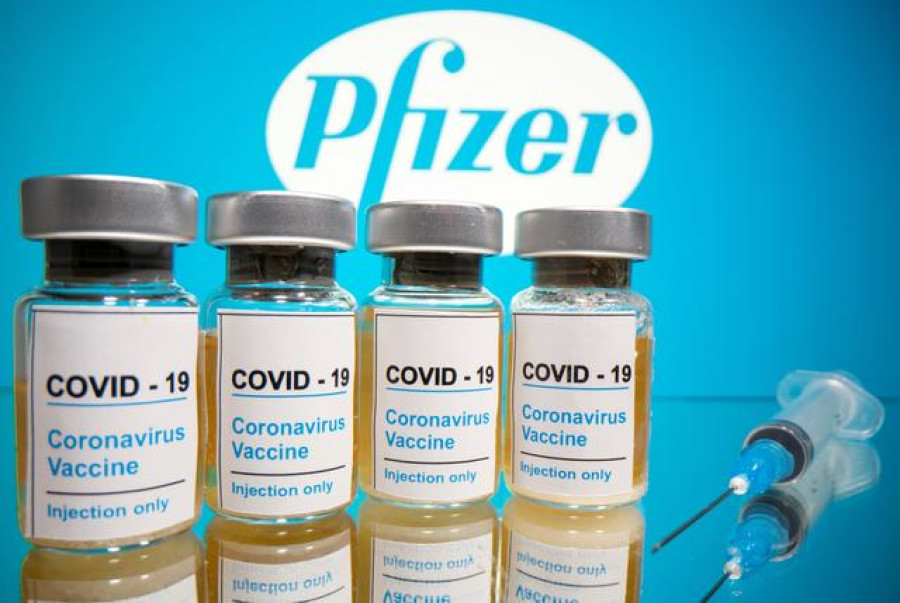Editorial
Race for a cure
The Oli administration needs to be on its toes about the latest vaccine developments.
A pandemic-battered world on Monday welcomed the announcement by United States drug maker Pfizer and German partner BioNTech that their vaccine is more than 90 percent effective in preventing Covid-19. The findings, based on preliminary data from late-stage human trials, have shown no serious safety concerns so far, according to the developers who described it as a 'great day for science and humanity'.
While the update from the two companies is a major breakthrough in the fight against the pandemic, it doesn’t mean that we can get the vaccine tomorrow or next month. Final results of the trial are still due, and more evidence is needed about the safety and effectiveness of the vaccine, which is now in Phase III study. The preliminary data, according to scientists, doesn’t say if the vaccine prevents severe cases or whether it prevents people from carrying the virus without symptoms. It is also unclear how long the immunity will last or if it works in different age groups and ethnicities.
The vaccine will also need regulatory approval before it is rolled out for the public. Scientists and public health officials have already hinted that the vaccine will not be available this year, and there’s a massive global demand to be catered to, one that will require the world to act together if it wants to contain the pandemic. Pfizer and BioNTech say they can produce up to 1.3 billion doses by the end of 2021 if they are granted regulatory approval.
According to the two companies, the vaccine will have to be administered in two doses around three weeks apart, but storage has already been flagged as a massive challenge as the vaccine needs to be kept in ultra-cold conditions at around minus 80 degrees Celsius. The super-cold storage infrastructure is something that the Oli administration must already start to explore besides working first to access the vaccine as ultra-cold freezer supplies are already limited, and there’s no way out if this is the only proven vaccine. To add, dozens more vaccines are currently under final stages of human trials, and scientists say there’s a possibility that there will be more than one vaccine that’s effective and would not require complex storing procedures.
Production and storage, however, are not the only issues as the world races for a cure. The World Health Organisation which welcomed the announcement has already warned that a funding gap could slow access to tests, medicines and vaccines in low-and middle-income countries. The Oli administration needs to take stock of the situation as the two companies seek US emergency use authorisation within this month.
Responding to the major announcement on Monday, Germany’s Health Minister Jens Spahn said that he didn’t expect the vaccine before the first quarter of 2021. The European Union also announced that it would sign up for up to 300 million doses with the drug makers, which already have a $1.95 billion contract with the US government to deliver 100 million doses. Similarly, the United Kingdom, Canada and Japan have also reached supply agreements.
While a robust public health response and the adoption of precautionary measures still remain our primary defence against the virus that has already killed over a million people and infected over 50 million people worldwide, the government needs to be on its toes about the latest developments on the race for a cure, and ensure that a vaccine once proven safe and effective, must be accessible to Nepalis. It must already start its homework for a free and nationwide inoculation campaign and identify priority groups and the logistics to deliver it.
There should be no room for blunders anymore as the country has witnessed right from the beginning of this pandemic. Until a proven vaccine or pharmaceutical cure arrives, we need to tread cautiously and implement the gold standard to deal with Covid-19—test, trace and isolate.
***
What do you think?
Dear reader, we’d like to hear from you. We regularly publish letters to the editor on contemporary issues or direct responses to something the Post has recently published. Please send your letters to [email protected] with "Letter to the Editor" in the subject line. Please include your name, location, and a contact address so one of our editors can reach out to you.




 9.89°C Kathmandu
9.89°C Kathmandu














